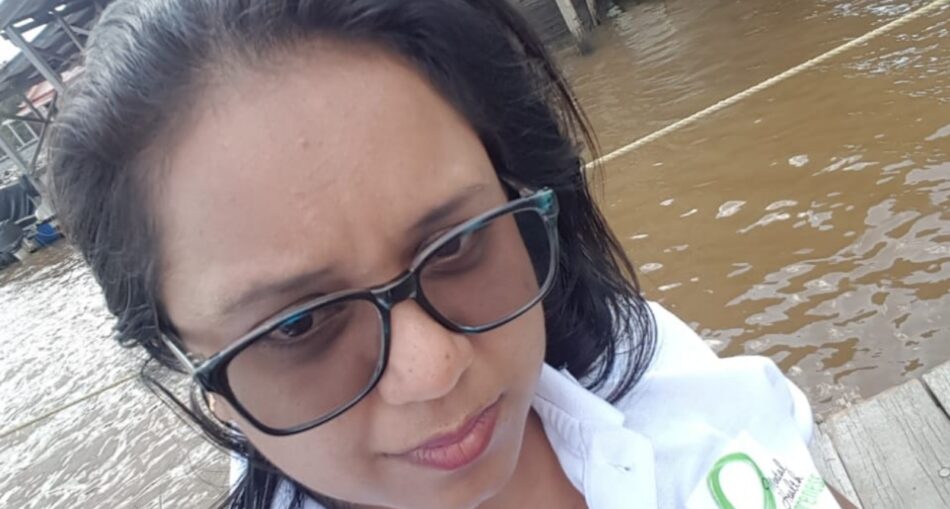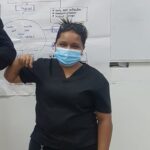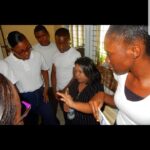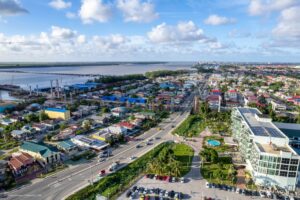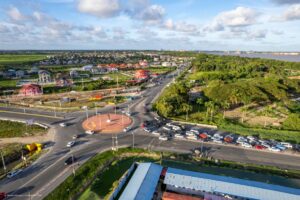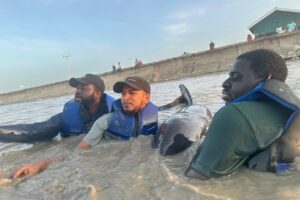Her goal in life is to “always try your best to serve people even if you are suffering.” And serving people for the last five (5) years, she has been doing, but most of all, inspirational is what she has become to all young people who might think that they cannot achieve anything in life.
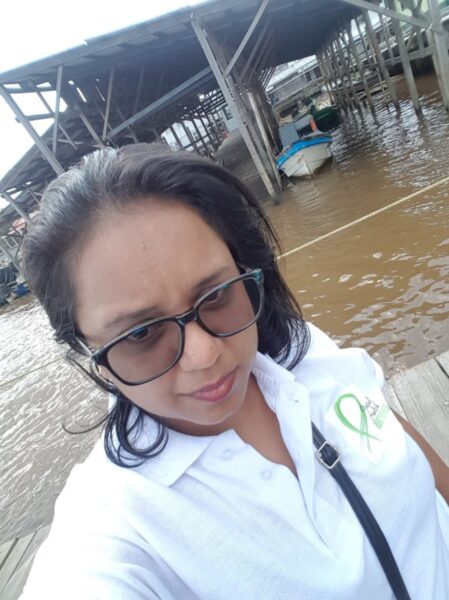
Dr. Andria Veeren
Twenty-nine-year-old Doctor Andria Veeren is an ambitious young woman with a determination that could move mountains. In fact, the person she is today is one who struggled a lot but has been making the proverbial lemonade with the lemons that life has been consistently throwing at her.
Andria was born on the 22nd March 1991 at home by a midwife in a house that was lent to her parents because the owners had migrated and her parents had nowhere else to go. She grew up with her brother and sister in Belvedere, Region Six (East Berbice – Corentyne).
The young woman recalled that her father, who used to and is still gainfully employed at the sugar estate, would purchase one (1) plyboard and zinc every week in a bid to build his own home.
I remember vividly when it was almost finished, and it was time to move, I was probably 4-year-old, I remember myself on a donkey cart transporting our stuff to the next house which became my real home, nothing big and fancy but it was home for me, and it still is. It is located on the other side of Belvedere. This is where I have all my childhood memories.
Like any other kid growing up in the country area, Andria recounted playing in the trenches, running in the rain, and even playing cricket in the streets.
She attended the Albion Nursery School, then the Cropper Primary School, where she gained a spot at the Berbice High School. But due to the long-distance coupled with transport costs, which her parents could not afford, she was then transferred to the Corentyne Comprehensive Secondary School.
During her stint at the Corentyne Comprehensive Secondary School, Andria pointed out that she was an all-rounder, school prefect, involved in interschool sports competitions, debate competitions, and academically capable.
“My parents didn’t go far in school, and I guess what they missed out on, they tried to provide for my siblings and me. I remember coming home from school; each of us had chores to do, whether sweeping the yard, watering the plants, or doing the dishes. Once that was finished, we ate, shower and went straight to bed, after saying our prayers and reading the bible.”
She added, “My mother would make it her duty to wake me up after a few hours to study. She would make tea and prepare something to eat at 11 or 12 in the night. I remember getting angry when she woke me. I would eat and go back to sleep when she goes back into her bed. But she would come out back with the belt; ‘time to study and why are you sleeping,’ she would ask.”
She added that when it was time to sit the Caribbean Secondary Education Certificate (CSEC), her mother would usually say, “study hard now, and you wouldn’t have to study back.” The young doctor said that, as far as she can recall, she always wanted to become a doctor.
I wanted to make people feel good, to help persons who are suffering as I have had firsthand experience in being sick also. I spend a lot of time running to doctors because of being sick. I have had surgery; I spent one month in hospital at one time, so I know what it feels like, and I remember how happy my family and I were every time I got better, and I wanted to pay it forward by becoming a doctor.
She added that growing up, her parents always instilled in her to be someone who can help others and serve people even if she is suffering.
“We didn’t have much; mother being a housewife and father works at a sugar estate, but my parents made sure we had food every day and a good education. I remember lots of time going to school with loose footwear, toes peeking out because it was not a new year as yet and money had to save up piece by piece to buy school stuff,” she recalled.
Despite the foregoing, the young lady said that she wouldn’t change anything about her childhood. She said the struggles and the sickness she endured had shaped her into the person she is today.
It was not bad all the time; I had my cousins and aunts who would sometimes in the morning pass and give me school money for the day or buy snacks. My parents would always say they don’t want us to punish like them, they don’t want us to be pushed around like them, and they want us to be somebody one day who can help those in need.
After completing her secondary education, the doctor ventured off to the University of Guyana, majoring in Biology and minoring Chemistry. However, not being financially able to continue paying for her studies, her lecturer advised her to apply for the Government scholarship to study in Cuba.
I applied against my parents’ will, my dad did not want me to go, but I fought for that as I knew nothing was going to keep me down. I wanted to become a doctor. I spent 6 years in Cuba; the first week, I cried and begged to come home back, but my dad was like, ‘no, you wanted this, so finish it.’ I had some really hard times in Cuba, but eventually adapted, got accustomed, and loved it now.
Dr. Veeren came back to Guyana in 2015 and started working at the Port Mourant Hospital, the Suddie Hospital, and the New Amsterdam Hospital.
The Medical Practitioner explained that she worked in the Internal Medicine Department but always had a passion for doing more. In fact, she revealed that she was rejected three (3) times when she applied for another scholarship to specialize in another area.
“Being a doctor is one thing, but during my years of work, I have seen firsthand how people were punishing not only physically but mentally. Sickness really takes a toll on persons and their families. Many times I pass, and I see people on the street suffering, and I think to myself that this cannot be all that I can do.”
Dr. Veeren added, “Yes, we treat persons and send them home, but nobody knows what is going on in their head, in their minds, so many thoughts of suicides, depression, anxiety that eventually leads persons to become psychotic and harm others and themselves.”
She noted that on many occasions, psychiatric patients are being discriminated against, as many persons don’t even want to pass close to them.
But they are all human beings and deserve the same care and compassion as any other patients, and this is something that must change. Showing a little compassion for your patients can help in their recovery faster, both physically and mentally, and hence I ventured out into the field of Psychiatry and started to work at the National Psychiatry Hospital.
However, heading over to the National Psychiatry Hospital was no walk in the park, Dr. Veeren said.
This was also a battle as I was giving the royal run around and was told I could not work there. I was told many things, but I kept on pushing, and at last, by God’s grace, I was granted the opportunity. I worked there for a few months, then I applied to do my Masters Degree of Medicine in Psychiatry and was accepted and have been working at GHPC Psychiatry department. I am presently in 2nd year of my residency program.
This ambitious, self-driven doctor credited her success to God and her family. She said that they have been with her throughout her journey and are still there with her.
Once I am giving the opportunity, I wish to see no more young people on the road, homeless because of substance use. I wish to see rehabilitation centers made available free of cost for our people, walk-in shelters for the homeless, special jobs to involve persons of lesser intelligence, no one should be left behind, more counseling centers made available countrywide for anyone who feels hopeless, and don’t feel like continuing their life journey.
- Dr. Veeren participating in a disaster related psychological trauma and mental health training
- Dr. Veeren lecturing nurses at the National Psychiatric Hospital
- Dr. Veeren during her graduation exercise
- Dr. Andria Veeren
- Dr. Andria Veeren
Dr. Veeren hopes to specialise in forensic psychiatry related to criminology in a bid to help persons who were wrongfully accused of. Her philosophy is “in a world where you can be anything, be kind.”

